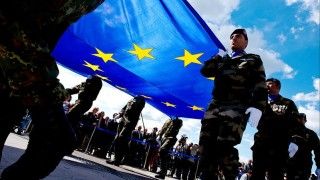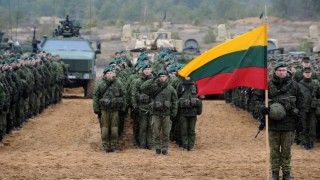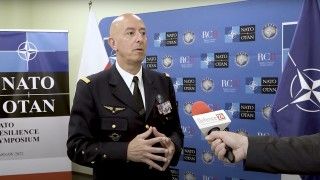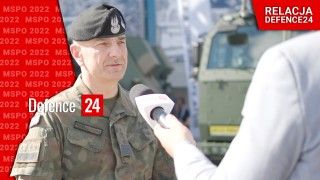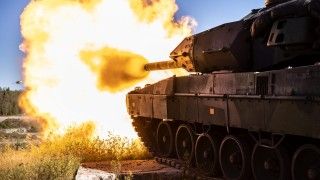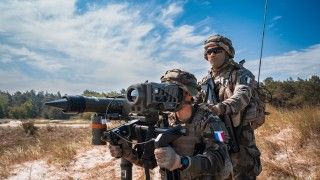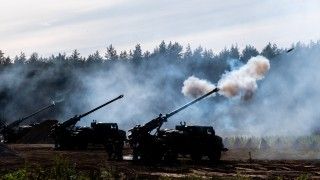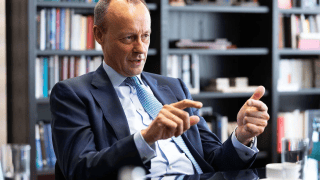- W CENTRUM UWAGI
- WIADOMOŚCI
- WYWIADY
"Custodian" NATO to guard the integrity of the territory. MNC NE commander: Russia is a threat to all nations
Defence24 had the opportunity to interview with Lieutenant General Jürgen-Joachim von Sandrart, Commander of the Multinational Corps Northeast (HQ MNC NE). This interview occurred during the GRIFFIN LIGHTNING 23 exercise at Joint Force Training Centre (JFTC) in Bydgoszcz, Poland. Jacek Raubo (Defence24) asked the General about the role and task of MNC NE and how the present situation is testing NATO’s readiness.
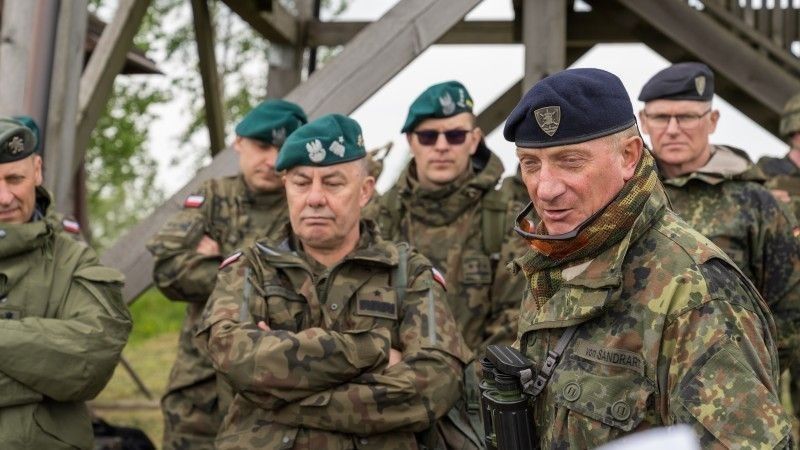
General, the beginning, I would like to warmly thank you for accepting Defence24 invitation for this interview. Sir, what is the current role of Multinational Corps Northeast within NATO and for the security of NATO's eastern flank?
Lieutenant General Jürgen-Joachim von Sandrart, Commander of the Multinational Corps Northeast (HQ MNC NE): I am very pleased to introduce you to the role of the headquarter that I have the honor to command since November 21 2021. I'm really proud to have the chance to command this great and in many respects unique NATO headquarter. It is a NATO force structure headquarters in the land domain with a dedicated area of responsibility ranging from Narva in Estonia to northeastern Poland. This includes the Suwalki Corridor, the narrow stripe connecting Poland and the Baltics. In total, we currently cover 2200 km direct boundary line to Russia and Belarus.
If you take a look at the map, you will instantly recognise how important this region is, especially after Russia's illegal annexation of Crimea in 2014. Especially after February 24th last year, we had to understand that Russia is a threat to all nations as well as a challenge to our free order as a whole where we want to live in. Our young generation wants to grow up in peace, and we are responsible for transitioning this safe, secure and free system to the next generation. We have the privilege to live in a free, secure and prospering Europe which I consider to be the Paradies on earth. With this knowledge comes the responsibility to preserve it in order to be handed over to the next generation.

There, Multinational Corps Northeast HQ plays an essential role because we are planning already in peacetime to protect the integrity of the three Baltic states and northwestern Poland. The Canadian Chief of Defence once called this 2200-kilometer boundary line "the boundary line of freedom". If you are a German general that grew up in the Cold War, I know what it means to live somewhere along such a border of freedom that, in those times, was the inner-German boundary line. And so, I am very much aware of my freedom, your freedom, the freedom of the people in Estonia, Lithuania, Latvia and Poland, the rest of Europe is dependent on the integrity of this boundary line of freedom. The Multinational Corps Northeast is NATO's custodian, the NATO entity that ensures the integrity of our territory in that region. We can, and we will do that if necessary.
Sir, you mentioned the response to the Crimea annexation. Have you seen significant differences before 2014 and after 2014?
After the Olympic Games in Sochi had ended, by military force, Russia invaded Crimea and illegally annexed it, which was a game changer. NATO has already recognized this game changer. All initiatives to reinforce NATO structures and our presence on the ground to be more responsive, more effective in defence started in 2014. However, Russia's renewed brutal war of aggression against Ukraine last year has accelerated this process significantly. And I think latest at that moment, it became clear to everybody in the free world that there currently is only one significant enemy that openly attacks our liberal, free, secure and prosperous understanding of civilized life, and that is Russia. So, we have responded accordingly. NATO has reacted to that. NATO has accelerated its defence planning, which started by implementing the multinational battlegroups deployed in Estonia, Latvia, Lithuania, and Poland. Now, we see a robust NATO structure in our area of responsibility of Multinational Corps Northeast that is ready to defend the integrity of our great nations and the Alliance as a whole at any time.
Sir, the role of Multinational Corps Northeast is also strictly connected with achieving adequate levels of interoperability between states. So, I would like to ask you about your experiences with this issue when considering the interoperability between Polish and Baltic state armed forces and other units from other states of NATO. Are we achieving the goal of interoperability right now in your area of responsibility?
First of all, I'm pretty confident that we will get there. And all we have achieved throughout the last 12 months was not invented only after this infamous date, February 24, 2022. The groundwork for our current Adaptation was laid before. However, to a degree, and I think I'm allowed to say that, we all have to "relearn NATO". The construct of NATO follows the narrative that no one can or rather no one should have to defend its nation's freedom alone. We must do it together. We have to act as one, as we do now, when we think about the responsibility to protect, ensure and sustain our freedom, our security, our liberal prosperity, and our way of life that is based on the rule of law. I grew up as the son of a NATO officer in the Cold War. I joined the service in 1982, during the Cold War. In those times, NATO acted collectively. And collectively, NATO successfully prevented a war against the Soviet Union and contributed to winning the Cold War. The last 20, 30 years, we were in the fortunate situation that there was no imminent threat to our alliance.

During that time, we were primarily focused on confronting threats beyond Alliance territory. Like in Afghanistan, in the Balkans, in Africa, we stood shoulder to shoulder as NATO Alliance and partners. But that was not collective defence. That was, to a certain extent, a sort of collective stabilization operations. In 2014, we had to refocus on Alliance defence because the period where a peer competitor like Russia does not any more threaten the alliance, unfortunately had to give way to appreciating the fact that this threat was and is imminent. A NATO-integrated, collective approach now has to be lived again, we must go back to what I said in the beginning - the understanding that no one can do it alone. That means we must do it together, which is only effective if done in an integrated and collective way. I think that is what NATO is currently experiencing, not inventing but resurrecting integrated collective defence. We have to aim high, leaving any notion of a nation centric approach to NATO behind. This will be successful, and Multinational Corps Northeast will ensure that it is implemented accordingly in our area of operation.
Sir, as I have heard, we are getting very positive signs from NATO preparedness. But I would like to ask you about more specific actions we need to deal with in this shorter or longer perspective because of Russian policy toward Europe.
It means we must have a common understanding of our defence posture. A ready defence posture builds on an executable, synchronised defence plan. Fully committing one's national capabilities to that plan constitute NATO's backbone. This signals that we share the burden and will act decisively as one if attacked.
If you want to get ready, we need to have an appropriate plan in place that is populated and assigned the required formations and capabilities. This plan is trained, and this iterative process of continuous planning, education, training, and exercises further improves this plan in a way Moscow understands. They are receiving a clear message that we will be successful in our defence. That creates deterrence. And that reassures nations. If you are ready, you prevent war. If you are not prepared, you might end up increasing the risk of war.
General, for people dealing with this issue, this is something essential that I would like to ask you. Therefore, from your perspective, how do you describe the C2 (command and control) structures in deterrence and defense, and how it's crucial for modern warfare?
Achieving effects depends on unity of effort and command. You can only play with one captain and team on the soccer field. You will not be successful if you divide the soccer field between six teams and six captains. And this simple example applies to NATO. What does it mean? For my Area of Operations this means to trust the command control of Multinational Corps Northeast. There is only one area of operation. There is only one mission. There is one plan, and there is only one team. It is as simple as that.
Yes, I agree that it's straightforward, but our readers will have a great picture of that. But what would be the role of multinational corporations in the event of a crisis or threat of war in the region? So what is your role in, of course, a hypothetical scenario for war here?
If you want to understand the idea of deterrence that results in the effect that we don't have to go to war, you must commit to a reverse engineering concept. Only if you are ready for the fight, you can prevent the fight. My responsibility and my main task now are to implement this reverse engineering. To plan to train and to exercise it. In order to prevent that, I have to start with the sharp end of the sword. We must be ready for the fight between Narva and the south of Suwalki, shoulder to shoulder with the host nations, with NATO allies willing to commit and deliver and deploy their forces and capabilities to support our efforts. And then we will succeed.

And now I would like to ask you, General, about your understanding of Multinational Corps Northeast's role in building effective posture in various NATO states' armed forces, for instance, in Poland or the Baltic States. What kind of lessons for NATO members in our region, but also in this holistic perspective of NATO, Multinational Corps Northeast offers?
First, what applies to every individual person, applies to nations and states and societies in the same way. Nobody is perfect, and persons are different in character and capabilities. So, of course, the three Baltic states, Poland, France, Germany and Britain are very different in structure, numbers and capabilities. But we have one thing in common. We want to preserve our way of life. And we want to protect it against anyone who wants to impose his vision on us.
My task is to identify further potential for improvement. To provide direction and guidance to achieve this in the notion that we are stronger together. This is nothing we achieve just like that. We have to understand this reality and adapt accordingly. It needs focused engagement by all of us. To sum it up: I see the need for a genuin whole of society-approach that goes way beyond the military instrument.
Of course, there is a difference between whether you are a front nation, where you can feel the threat, or you are located in the European depth. I like the analogy of (John F. - JR) Kennedy's words and take the liberty to apply them to NATO. Don't ask what NATO can do for you. The question is what you have to do for NATO.
This should be approached holistically from the start. This requires accurate messaging that goes well beyond my responsibility as a military leader. Our politicians, societies, journalists, and academics need to contribute to that so that in maybe three, five, or ten years this is common understanding. That is developed in a way that is sustainable for generations.
Unfortunately, we still struggle with the problem of presenting NATO in the space of public debate as an ineffective structure. General, isn't the fight for an appropriate narrative around allied activity today a more significant challenge than transforming military resources?
I consider our discussion and varying opinions an asset rather than liability. I tell the Polish people that you own the most effective NATO headquarters. You have more NATO soldiers on your ground than any other European nation. And the US is NATO, the UK is NATO, Poland is NATO, Germany is NATO, France is NATO, and we are all here. $$

Finally, I would like to ask you about Griffin Lightning-23 exercises. What kind of exercise is it, and what is the role of Multinational Corps Northeast in it?
My Corps's role is to conduct this exercise to train our subordinated formations, divisions, and Multinational Division North, the Estonian division, a Polish Division, and Multinational Division North-East and to make them fit for purpose. It helps us to review our plans, to make them stronger, verify them, or to challenge them, to ultimately give them a stress test. The only alternative for such an exercise would be to test our plan in wartime.
So that's why we train to plan. We train as realistically as possible. We train as we fight. And this exercise has taken us a significant step ahead and has assured the individual headquarters that we have the appropriate capabilities. At the same time, it has shown us where there is still room for further improvement.
Thank you very much, General, for this interview.













